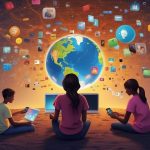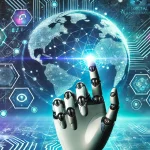Introduction
Artificial intelligence, entertainment, and international diplomacy might seem like distant worlds, but today, they intersect more than ever before. The fusion of technology, global politics, and media has created a new framework for influence and soft power.
From movie studios to government think tanks, AI is transforming how nations project their image and how global audiences interpret events. This digital synergy is redefining international relations in profound and unexpected ways.
The Rise of AI in Global Governance
AI is becoming a crucial tool for governments seeking to improve public administration and foreign relations. Through predictive analytics and data modeling, leaders can forecast economic trends, monitor conflicts, and assess climate risks.
This integration of technology into diplomacy allows for smarter decision-making, but it also raises questions about data ownership and bias. Nations with advanced AI capabilities hold a strategic edge, turning technology into a form of political leverage.
Entertainment as a Diplomatic Tool
Cultural influence has long been a form of diplomacy, and in the digital era, entertainment serves as a bridge between nations. Streaming platforms, films, and music carry messages that transcend borders and shape perceptions of identity and policy.
Countries now invest in entertainment exports as part of soft power strategy, with AI helping to analyze audience preferences and maximize global reach. From K-pop to Hollywood, the blend of culture and data has become a global phenomenon.
Celebrity Advocacy in International Policy
Celebrities increasingly play roles once reserved for diplomats. Influential figures like Angelina Jolie, Leonardo DiCaprio, and Malala Yousafzai leverage their fame to influence humanitarian and environmental policy.
These public figures collaborate with governments and NGOs, often amplifying global causes through social media. Their ability to mobilize millions online has turned celebrity influence into a form of modern diplomacy.
The Digital Battlefield of Information
AI has transformed the way nations engage in information warfare. Algorithms can now manipulate narratives, generate fake news, and shape public sentiment at unprecedented speed and scale.
This new form of soft conflict challenges global stability, as disinformation campaigns blur truth and propaganda. As a result, transparency and cybersecurity have become vital elements of diplomatic relations.
Entertainment Technology and Global Politics
AI-driven entertainment such as virtual influencers, deepfake actors, and personalized streaming content blurs the line between creativity and manipulation. What once was fiction now plays an active role in shaping global consciousness.
This technological revolution not only redefines entertainment but also influences public trust, political engagement, and social values across cultures. Governments and corporations alike recognize the strategic power of digital storytelling.
The Future of AI-Powered Diplomacy
Diplomatic communication is rapidly shifting toward automation and digital mediation. AI chatbots now assist in international negotiations, data-driven insights guide treaties, and virtual summits replace traditional gatherings.
However, as the human touch fades from diplomacy, ethical and moral considerations must remain central. The challenge lies in ensuring that technology serves peace rather than polarization.
FAQs
How is AI used in global governance?
AI helps governments analyze data, manage crises, and predict outcomes, enhancing diplomatic and policy decisions.
What role does entertainment play in diplomacy?
Entertainment promotes cultural understanding and shapes international perceptions, acting as a bridge between nations.
Why are celebrities involved in international issues?
Celebrities amplify awareness of humanitarian and environmental causes, influencing both public opinion and policy.
What is AI’s role in disinformation?
AI can create, spread, and amplify fake content, making it harder to distinguish truth from manipulation online.
How does AI affect future diplomacy?
AI enhances efficiency in decision-making but risks dehumanizing negotiations if ethical frameworks are ignored.
Conclusion
Artificial intelligence, entertainment, and diplomacy are converging to form a new paradigm of global interaction. Nations no longer rely solely on military or economic power; influence now flows through technology, culture, and communication.
The key to sustainable global progress lies in using AI not as a weapon of control but as a tool for cooperation. If managed responsibly, this alliance of innovation and diplomacy could lead to a more transparent and interconnected world.








